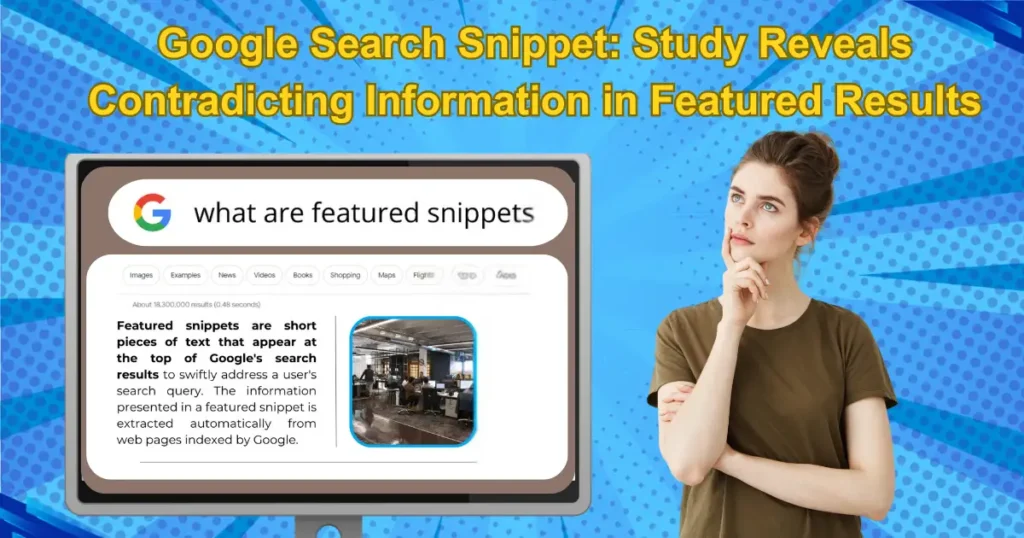
In the new digital world, access to quick and accurate information is considered vital. It is now Google’s goal to give instant answers which also leads to giving the user search snippets. But it has now become clear that this new study says there is conflicting information such as snippets present and go on to mislead the users while adding effects to online information accuracy. This post elaborates on what they are, why conflicts occur, what this research means, and how users can overcome conflicting information on Google’s search result pages.
What Are Google Search Snippets?
Google Search Snippets Google Snippets are short highlighted answers that appear at the top of search results to deliver fast information relevant to a query. Snippets might be in the form of text boxes, lists, tables, or images, summarizing content from multiple sources. Some common types include Types of Google Snippets.
- Featured Snippets. Sometimes appearing at the very top of the page for your Google search, they are called “position zero.” These comprise the shorter answers to questions throughout the web.
- Knowledge Panels. These appear on the right-hand side of search results as brief facts about people, places, events, and more.
- People Also Ask (PAA): These are expandable question-answer boxes that offer related answers to the query of the user.
- Answer Boxes: These are answer boxes which give instantaneous answers usually to facts like conversions, dates, or definitions of something.
These snippets are crucial in offering quick information but sometimes, as the research points out, cause problems of competing information that can hinder the user experience.
Role of Google Snippets in Information Intake
With millions of searches per day, Google snippets rely on the powers of Google to effectively provide credible information to users. It has been proved that more than 50% of the searchers click on the snippet without scrolling down further for more information. Such a high reliance on snippets makes them an essential element in public knowledge and opinion formation. Snippets on health, money, events, or any other sensitive matter may directly affect the decision of an individual due to an instant insight.
It will then mislead or confuse them rather than having the effect of leading people astray when snippets are in conflict with each other. Synchronization of snippets is much more in demand in life’s areas that matter, like medical advice or the latest news updates.
Key Research Findings on Conflicting Snippets’ Information
Some of the latest study has very important results in the following points:
- Overlapping Conflicting Information: In addition, most of the same questions, of course, get snippets, but their answers are conflicting ones. This mainly prevails when topics include health, finance, and news.
- Algorithmic Limitation Bias: Google’s algorithms favour diverse views, but they sometimes present users with conflicting information.
- Highly Sensitive Categories: There were health or finance information and news searches that were highly specifically susceptible to the conflict, hence heightening the fears of the spread of misinformation in such categories.
These results point out a massive problem with having Google snippets provide the correct and accurate information for the user to retrieve.
Why Conflicting Information Appears in Google Snippets?
There are various reasons why conflicting information shows up on Google snippets.
- Algorithm Limitations :
Google algorithms have been known to index and rank pages according to relevance. Though sometimes this produces controversial views, it also contributes to creating conflicting information. For instance, an algorithm may be biased toward the more popular pages because it favours them, even though they have slightly different content.
- Resource diversification with multiple opinions :
A chunk sometimes extracts data from more than one source to come up with an all-inclusive answer to the question for the user. Depending on how sources interpret data or information, inconsistency in the answer may emerge. In health or finance, a chunk will illustrate many different ways and opinions of experts with opposing information presented.
- Complexity of the query for search
Essentially, snippets are the reflections of possible different interpretations of the question when query meanings are more complex and vague, and algorithms devised by Google cannot determine a single “right” answer.
Thus, according to the intention that the algorithm derives from the query, users will be presented with a multitude of different conflictive answers.
Impact of Conflicting Information on the User
There are a couple of ways that conflicting information in the snippets can affect users:
- Erosion of faith in Google as an information resource: Repeated exposure to conflicting bits may make the user doubt the sources and reliability of search results supplied by Google.
- Possible dissipation of wrong information: In health or finance, bad or conflicting advice spreads fast, which makes the user wrongly make a decision.
- User Confusion and Confusion: If snippets returned for a query have conflicting pieces of information, then users get confused or at least left hanging about which ones are actually true and which aren’t, which kills the purpose of quick answers altogether.
Examples of Conflicting Snippets at Google
This study had already determined some illustrations wherein real-world clips indeed carried conflicting information. This list includes several of those common genres.
Health-related questions like symptoms or treatment options are the most conflicting type of snippet. For example, for “best cure for sore throat,” you get half a dozen different snippets each recommending some other remedy. This can horribly mislead the users in situations where it’s life-critical.
Matters of finance are inherently contradictory, with the snippets meant to advise on how one should invest or retire potentially misleading an end user to follow inconsistent recommendations. Searches for the “best investment strategies” likely will cross paths with snippets full of conflicting approaches and muddying already somewhat opaque personal finance landscapes.
Breaking News and Current Events
With unwinding events, the snippets could be carrying different information as the news happens to advance. This then creates chances that users may get outdated or wrong snippets if Google has not updated its featured results due to time lags leading to false information in fast-changing scenarios.
How does SEO influence the accuracy of snippets:
One critical way in which SEO influences the content Google displays as snippets is content that appears at the very top of the page when doing a search. Sites are competing for higher rankings and at times optimize directly for snippets, “position zero,” so to speak near visibility, not necessarily truth, matters and can creep subtly into conflicts.
For instance, a result for some keyword might be displayed because one point of view or outdated information is in search results. This raises many questions regarding the effectiveness of SEO practices to either strengthen or weaken users’ confidence in information retrieved in snippets.
How Google Has Addressed Noted Conflicting Snippets
In response to competing bits of information, Google has made a grand effort, in the scope of its mission, to make the bits more trusted as part of its efforts to refine and update its algorithms of what to include and how. Some examples are as follows:
Algorithm Updates: Google continually updates its algorithms based on the ranking of the content on the basis of quality and relevance. However, the problem here is that it shows this unforeseen effect, even when the updates are minor.
Content Relevance Checking: Google tries very hard to check the relevance and authority of sensitive fields like health.
This should be accomplished in greater measures considering the efforts Google has placed into machine learning’s ability to learn faster and more rapidly about changes in user queries and trending topics. After all, some disagreements still prevail, even in machine learning.
Even with all of these efforts, however, the volume of information that Google’s algorithms process is so enormous that probably conflicting information will still leak within its ranks.
How Algorithms Work by Google for Snippet Selection
The next part of this problem requires an understanding of what Google decides to display as a snippet. It depends on ranking signals, in relevance, authority, and keyword usage. The ranking may favour some content because it seems that the information is popular or referenced far and wide, even though presenting a slightly different view compared with other sources.
Apart from that, Google algorithms are put together to understand content at its most basic level. They might neglect nuance or context, and could easily go off-target if the query is ambiguous or multifaceted, which would increase the chances of conflicting information appearing in the snippet listed in search results.
Recommendations of the Study in Reducing Conflicting Information in Snippets
According to the research, here is the way Google may make snippets less conflicting:
- Increased Algorithm Transparency: It will be transparent on how it chooses the snippets and thus, it would make users understand reasons why such information is appearing in search results.
- More Control with Sensitive Content: A query related to health or finance would require more control and would be vulnerable to human evaluation, so uniformity would be given along with higher accuracy.
- New Standards in Content Curation: The algorithms of Google in their result would update automatically to emphasise snippet consistency so that very often, there would not be a conflict displayed.
These are the suggestions in the direction of making snippets from Google a reliable information source for users.
Alternatives of Google Snippets in Finding Reliable Information Sources:
Official Sites and Actual Sources: A person can gather actual facts from sites which are either governmental or medicinal sites.
Verification with Multiple Sources: Verifying with a few or several authentic sources enables the users to gain well-balanced views and cross-check information.
Professional and Peer Reviewed Journals: For detailed topics, one can make use of various journals for research work in an accurate and authentic form.
Auxiliary sources are very suitable for users who want detailed and consistent information.
How Users Can Identify Conflicting Information in Snippets
- Corroborate information. Verifying more than one source ensures that snippet information is corroborated by other reliable sources.
- Check the date of publication. Obsolete information can leak out as a snippet, especially regarding fast-moving subjects. Always check out the date of publication for context.
- Bury deeper than snips: More than the veracity of an answer in the snippet, one can know more by unearthing information from search results to have a better understanding.
These best practices would ensure that users get the best possible decision, even if Google’s snippets conflict with each other.
Conclusion
Although Google Snippets do present a really useful method of information lookup on the fly, the discovery from the latest study puts forth a very alarming problem in the fact that snippets sometimes have information that might be conflicting and therefore misleading to the user. This kind of inconsistency can be found through the manner with which facts and information people research on such mundane matters as health advice or financial planning to researching pivotal scientific and technological breakthroughs are interpreted.




